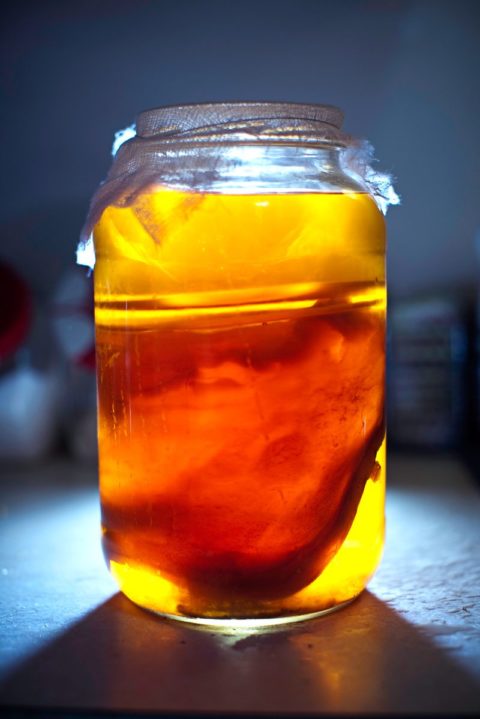5 disgusting foods that are actually so good for you

There are plenty of food trends that we can get behind: We’ll take cronuts, tacos and Brooklyn-style pizzas any day. But when it comes to the latest nutrition fads? Let’s just say these superfoods aren’t your typical fruits and vegetables. But nutritionists are extolling their virtues nonstop, so read on to find out what totally gross things are actually really good for you. (Picky eaters beware.)
Scobies
The fermented tea is said to improve your digestion by rebalancing your gut bacteria, and it increases your energy levels and even helps you deal with stress. The Big Book of Kombucha also describes it as an adaptogen, meaning it helps the body achieve balance and decreases the negative effects of stress. Though you’ll often, if not always, get a slimy strand of bacterial culture when you sip (it’s totally normal, and good for you!), the most shocking part about it is seen when you brew it at home or go behind the scenes at a production plant. The SCOBY (symbiotic culture of bacteria and yeast) is a floppy pancake-like substance that is used to start the fermentation process, and it stays on top of the brew throughout. You don’t eat it, thankfully, but just looking at it could cause you to lose your appetite.
Crickets
While many cultures consider some insects part of delicious dishes, like dragonfly lawar in Bali, likely the closest you’ve gotten to eating bugs is catching one in your mouth when out for a run. But lately crickets have been garnering buzz (sorry) for their high protein content and environmental benefits. There are already companies selling products with cricket protein, such as Exo, which has sweet and savoury protein bars, as well as Chapul, which offers bars as well as cricket protein powder and flours. Exo writes on its site that cricket flour is 65% protein, as opposed to beef jerky or chicken, which are 33% and 23% protein, respectively. Consuming cricket protein is also a good way to lower greenhouse gases, since crickets produce much less than cows do.
Bone broth
This isn’t soup stock that comes in a carton; this is the real deal—like the kind of stuff your grandparents used to make with extra bones after a roast dinner. For some people, the idea of boiling down animal bones for up to 24 hours can be unappetizing. But a simple steaming cup of bone broth is chock-full of collagen, minerals and amino acids, which is great for your skin, nails, hair and overall immunity. To make your own, go to your organic butcher and request bones for broth (organic, preferably those from the joints), and spice it up to your heart’s content. You can even use it as a base for soups or to boost the nutritional value of other dishes.
Chaga
OK, so we’ve known the benefits of mushrooms for a long time now and have gotten over the fact that they’re really fungus. But medicinal mushrooms, like chaga, are the latest powerhouses that foragers and health aficionados alike are after. Loaded with the antioxidant melanin, it helps reduce inflammation in the body, might have anti-tumour properties, fights the cold/flu, helps the liver regenerate and can even help minimize aging of the skin (basically, there’s something for everyone). You can take it by boiling it in water to make a tea (the pieces look like mini chunks of bark), or consume it as a tincture or powder. Though it might seem bitter at first, this could replace your daily cup of coffee—or at least one of them.
Algae
Asian countries have known about the benefits of slimy sea vegetables for ages, and for good reason: algae, like nori and wakame, are super-rich in minerals, like iodine. (For this reason, if you have thyroid issues, you should talk to your doctor about whether or not to make algae a part of your diet.) Part of why they’re so good for you can be traced back to fucoidans, a molecule that has anti-inflammatory properties, and seaweed is also said to have anti-viral, anti-cancer and heart-health promoting benefits. But the algae that’s really catching the our attention is spirulina, a blue-green algae that’s available at your health food store in tablets or powder. High in essential fatty acids and protein, it’s a great addition to smoothies and juices and decidedly easier to work with than dehydrated sea veggies.








